|
|
|
Sort Order |
|
|
|
Items / Page
|
|
|
|
|
|
|
| Srl | Item |
| 1 |
ID:
101966
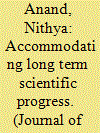

|
|
|
| 2 |
ID:
185895
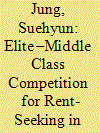

|
|
|
|
|
| Summary/Abstract |
This paper examines the anti-corruption movement initiated by Kim Jong Un, focusing on the increased rent-seeking competition between the elite and the middle class as market mechanisms have developed in North Korea. I examine two hypotheses regarding this program. First, it is focused on constraining the influence gained by the elite through power–money collusion to maintain regime stability. Second, it aims to support decentralizing economic reforms and the direction of production surplus into state finances, to secure state revenue. In substantiating these hypotheses, I argue that the movement is driven by the goal of capitalizing on the benefits of the market without compromising regime security, by regulating “competitive rent-seeking” between the elite and the middle class.
|
|
|
|
|
|
|
|
|
|
|
|
|
|
|
|
| 3 |
ID:
150916


|
|
|
|
|
| Summary/Abstract |
During the “golden decade” (2001–2011) of the coal industry in China, rent-seeking increased in coal mine safety supervision alongside significant improvements in coal mine safety status and increased economic benefits in the coal industry. To explore this internal relationship, we developed a Matlab simulation system and simulated the impact of rent-seeking from each level of the supervision department on coal mine productivity in different scenarios. The results showed the following. (1) Rent-seeking had no significant influence on the average level of material productivity but it had an adverse effect on the average level of mental productivity. Due to the effects of rent-seeking, productivity tended to exhibit unstable and destructive fluctuations, and rent-seeking had the dual effect of promoting and restraining productivity in a wide range with a high frequency. (2) In the supervision scenario, supervision by the high-level department was efficient, and productivity was promoted more by the national and provincial supervision department. (3) In the rent-seeking scenario, each level of the department had an intensity threshold above which coal mine accidents occurred. We also propose suggestions that focuses on the improved supervision of Chinese coal mine safety in three areas based on the “new normal” safety concept.
|
|
|
|
|
|
|
|
|
|
|
|
|
|
|
|
| 4 |
ID:
082644


|
|
|
|
|
| Publication |
2008.
|
| Summary/Abstract |
Although achieving impressive economic growth during the economic reform period, China has been plagued by rampant corruption and a widening income gap. How can the coexistence these two phenomena be explained? In this paper, we argue that before 1994, the coexistence was induced by a series of expediential institutional arrangements to stimulate entrepreneurial activities and after 1994, it was entrenched because of the slow progress in the overall reform toward becoming a market economy and because of inappropriate government actions and the lack of government action in institutional building. To solve these problems, economic and political reforms need to be accelerated to improve market institutions and to establish the rule of law.
|
|
|
|
|
|
|
|
|
|
|
|
|
|
|
|
| 5 |
ID:
083595


|
|
|
|
|
| Publication |
2008.
|
| Summary/Abstract |
Examining the politics of local-level extraction in Uzbekistan, this article identifies the emergence of two rent-seeking strategies among local prokurators. Using case study material from Samarkand Province and Navoii Province, it demonstrates how concentrated economic resources under rural elites and dense patronage ties to regional politicians determine the limits placed on rent seeking. As this analysis seeks to emphasize, state capabilities within Uzbekistan's territorial infrastructure, and their effects on extraction, are multi-faceted, highly fluid, and intimately local
|
|
|
|
|
|
|
|
|
|
|
|
|
|
|
|
| 6 |
ID:
157831
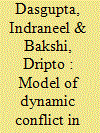

|
|
|
|
|
| Summary/Abstract |
We model an infinitely repeated Tullock contest, over the sharing of some given resource, between two ethnic groups. The resource is allocated by a composite state institution according to relative ethnic control; hence the ethnic groups contest the extent of institutional ethnic bias. The contest yields the per-period relative influence over institutions, which partly spills over into the next period, by affecting relative conflict efficiency. Our model generates non-monotone evolution of both conflict and distribution. Results suggest that external interventions, when effective in reducing current conflict and protecting weaker groups, may end up sowing the seeds of greater future conflict.
|
|
|
|
|
|
|
|
|
|
|
|
|
|
|
|
| 7 |
ID:
174368
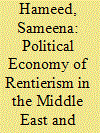

|
|
|
|
|
| Summary/Abstract |
Rentierism in the Middle East and North Africa (MENA) region had emanated both from significant external rent and from the statist model of development feeding each other, where legitimacy was secured through rent distribution. The rent-led resource imbalance between the state and the society, as well as intra-societal inequalities in the region, has been less recognized and studied. The flow of external rent in tandem with internal rent-seeking has perpetuated the wealth and power of the political and economic elites and limited economic opportunities of the larger population. The rentierism that bred on vertical controls and network of privileges is set to be disrupted from flows and connectivity generated in the growth of digital commerce in the region.
|
|
|
|
|
|
|
|
|
|
|
|
|
|
|
|
| 8 |
ID:
152383
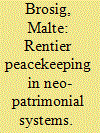

|
|
|
|
|
| Summary/Abstract |
International peacekeeping in Africa has developed dynamically in the last decade. The majority of global missions are deployed to the continent, the largest regional contingent of troops comes from Africa, and the African Peace and Security Architecture has made significant progress. Peacekeeping is Africanized today more than at any time before. However, mainstream research has insufficiently paid attention to African agency in this context. This article sheds light on the often neglected influence of African politics on international peacekeeping missions. The focus is set on the consequences of neo-patrimonial political systems, which can use international peacekeeping missions as an opportunity to generate rents. It will be shown that such a rent-seeking approach is highly problematic for the troop-contributing as well as mission-hosting countries. Instead of curbing conflict, rentier peacekeeping is prolonging and exporting it. The empirical examples used are the Burundian and Kenyan involvement in peacekeeping in Somalia.
|
|
|
|
|
|
|
|
|
|
|
|
|
|
|
|
| 9 |
ID:
187976


|
|
|
|
|
| Summary/Abstract |
This article examines the sources of corruption in authoritarian regimes, focusing on the effect of time variance on the level of corruption, personalist concentration of power, and the regime stability (ruler’s expectations for remaining in power). The Personalism Index developed by J. Wright and the Varieties of Democracy (V-Dem) Corruption Index were used in order to construct the panel data covering 2001–2010 for fifty-eight authoritarian states. The empirical findings show that authoritarian regimes with a higher personalist concentration are more prone to corruption, and that short sighted and vulnerable authoritarian regimes are more corrupt. From a policy perspective, the results suggest that reinforcing institutions which can impose political restrictions on top leaders from arbitrarily allocating resources via rent-seeking can be effective in curbing corruption in authoritarian regimes. On the other hand, the results also indicate that an authoritarian leader with longer time horizon can implement the institutions which can improve economic performance, thus leading to lower levels of corruption.
|
|
|
|
|
|
|
|
|
|
|
|
|
|
|
|
|
|
|
|
|